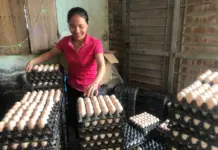
Pieu headscarves of Black Thai women
Customarily, Thai people judge a woman by her Pieu scarves. They’re an indispensable part of the unique beauty of her costume.
For all black Thai women, their Pieu scarf is the center piece of their everyday dress, a gift they offer to the chosen one of their heart, and an offering during worship ceremonies.
Hoang Thi Mai, a 71-year-old craftswoman who lives in Son La province said, “The Pieu scarf is indispensable to every woman. Before her wedding, she must embroider at least 30 Pieus to give to the parents and family of her future husband. On the death of one of the two spouses, a Pieu is cut in two, and one of the halves is used to cover the face of the deceased person. The other person will keep the remaining half until the end of his or her life. At the time of his or her death, this half will be used to cover his or her face. That way, the couple will be able to meet in the other world.”
Any self-respecting Black Thai mother is eager to teach her daughter how to make a Pieu scarf. First she must select a beautiful piece of white fabric, preferably hand-woven. This fabric is then dyed black and embroidered with different colors. The decorations are only at the two ends of the scarf.
The traditional technique is to embroider on the back the pattern that appears on the front, often a plant or flower motif. Once the embroidery is completed, the scarf is lined with red fabric throughout its length.

Black Thai women carefully make their Pieus.
Thai women generally wear a scarf with three leaves at each end, but when they offer a Pieu to someone else, it should have at least five leaves, says Lu Thi Chum, a Black Thai woman from Son La.
She explained how to make the leaves: “To create these leaves, we roll a strip of red fabric about a centimeter wide around a core made of threads to make a cone representing the leaf. My mother taught me how to embroider. I want to share that know-how so that Thai cultural identity will never be lost.”
Today many young Black Thai girls no longer know how to embroider. Teaching them the traditional techniques has therefore become a priority for the authorities and women’s associations in many parts of the Northwest, according to Quang Thi Vin, president of the Women’s Union of Son La.
“Every year, as part of the Bauhinia Flower Festival, we organize a Pieu embroidery competition. This is an opportunity for women to meet, learn from each other, perpetuate the tradition, and pass it on to future generations,” Vin said.
If in their daily lives Black Thai women now prefer modern clothes for comfort, it is out of the question for them to totally give up their traditional dress, especially their Pieu scarves. VOV



